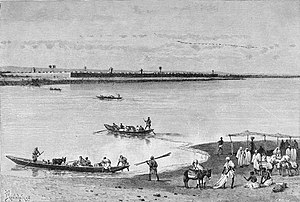Logone-Birni
Logone-Birni
Logone, Lagone | |
|---|---|
 Logone-Birni, 1892 | |
| Land | |
| Province | Far North Province |
| Division | Logone-et-Chari |
| Population | |
| • Ethnicities | Kotoko |
| • Religions | Islam |
Logone-Birni is a town and commune in Cameroon. The town lies on the left (west) bank of the Logone River which at this point forms the state boundary between Camaroon and Chad. It is the capital of the Kotoko people, whose two other principal cities are Kousséri and Goulfey.[1]
History
Logone-Birne means Fort Logone and was founded around 1700 by Prince Bruha.[1]. Dixon Denham visited Logone on 23 january 1824. He reported:
- "I rode down the river, which here flows with great beauty and majesty past the high walls of this capital Loggun; it comes direct from the south-west, with a rapid current. We enetred the town by the western gate, which leads to the principle street: it is as wide as Pall Mall and has large dwellings on each side, built with great uniformity, each having a courtyard in front, surrounded by a wall, and a handsome entrance. witha strong door hasped with iron: a number of the inhabitants were seated at their doors for the purpose of seeing us enter, with their slaves ranged behind them".[2]
Gannibal
Logone-Birni has been suggested as the birth place of Abram Petrovich Gannibal, a General in the Imperial Russian Army and great-grandfather of Alexander Pushkin.[1] This view was first aired by Vladimir Nobokov in 1962, albeit in a dismissive remark.[3] The predominant view, however, was that Gannibal was from Ethiopia. As Hugh barnes suggested this may have arisen from the generic use of the term "Ethiopian" to cover all of Africa.[1] However, in 1998 Dieudonné Gnammankou convincingly argued
See also
References
- ^ a b c d Barnes, Hugh (2005). Gannibal : the moor of Petersburg. London: Profile Books. ISBN 9781861973658.
{{cite book}}:|access-date=requires|url=(help) - ^ Denham, Dixon; Clapperton, Hugh; Oudney, Walter (1826). Narrative of travels and discoveries in Northern and Central Africa: in the years 1822, 1823, and 1824 (2 Volumes). London: Murray. Volume 2 p 14
- ^ Nabokov, Vladimir (1962). "Pushkin and Gannibal". Encounter. 19 (1): 11–26. Retrieved 31 January 2016.
- Site de la primature - Élections municipales 2002 Template:Fr icon
- Contrôle de gestion et performance des services publics communaux des villes camerounaises - Thèse de Donation Avele, Université Montesquieu Bordeaux IV Template:Fr icon
- Charles Nanga, La réforme de l’administration territoriale au Cameroun à la lumière de la loi constitutionnelle n° 96/06 du 18 janvier 1996, Mémoire ENA. Template:Fr icon
11°47′N 15°06′E / 11.783°N 15.100°E
